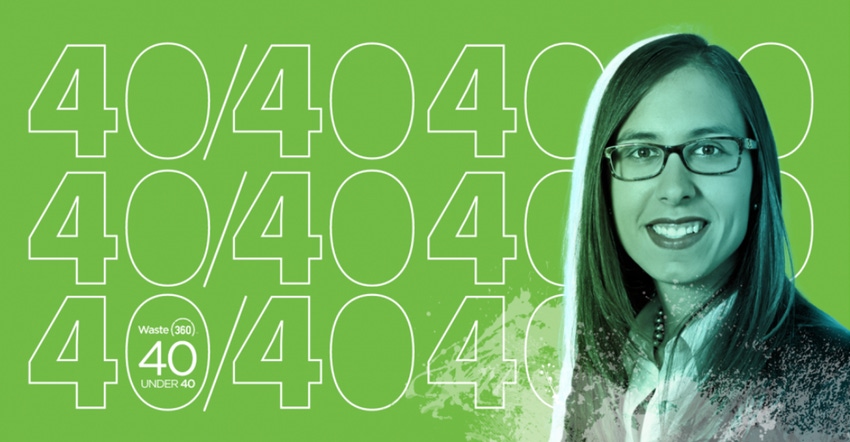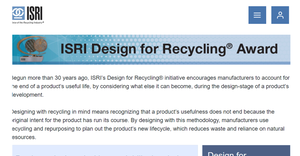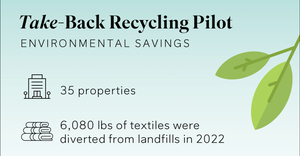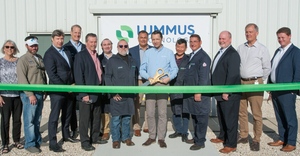
Dr. Stephanie Bolyard has a lot on her plate these days.
While the Waste360 40 Under 40 recipient's most intense research was completed before she started a family, she hasn't slowed down on finding solutions for the solid waste industry.
Dr. Bolyard formerly managed EREF's research program that funds about $1 million dollars per year in research. In any given year, she is managing more than 20 active research projects. She also recently co-authored a paper that was listed in the top 10% of papers published in 2020 in the Journal of Environmental Science: Water Research & Technology (PFAS leachate).
She recently spoke with Waste360 about her quest for knowledge in the solid waste industry and how her passion for PFAS in leachate drives her research projects.
Waste360: What led you to pursue a career in waste – especially one that is research-focused?
Bolyard: When I started graduate school, I wasn't really sure what I wanted to do, and I joined a bunch of professional organizations. I was trying to find an advisor to work with, and it took me about a year and a half to find a funded project. During that time, I had met the Society of Environmental Engineers' faculty advisor (Debbie Reinhart). I had emailed the club’s faculty advisor and said I received my first 4.0 GPA that semester, and I got an instant reply back. This is important because that ended up being my graduate advisor. For me, anyone who's willing to take time out of their busy day to acknowledge a student they don't even know yet - I think says something about them as a person. It's someone I wanted to work with, but it also came down to having an interest in that topic too. At the time, I was working for the Florida Department of Environment Protection and I started to have an interest in biosolids. There was a biosolid ash project going on with a local private company that I was familiar with and Debbie Reinhart was involved in. Initially I started working with Debbie Reinhart on an environmental engineering body of knowledge survey. She received funding for an EREF project, and she knew I was looking for a project around that time as well. I also worked with her to apply for funding through the Hinkley Center for Solid and Hazardous Waste Management. I had the opportunity to pick between a project on nanotechnology or construction demolition debris, and I decided that I wanted to work in the lab and do research. It really came down to funding and also an interest in the field because of some of the individuals that I started meeting.
Waste360: Who has inspired you along the way?
Bolyard: I think Debbie Reinhart, my advisor, was very helpful in that because as a graduate student, when you start looking at people that you want to start working with before you even meet them, you look at what they've accomplished and you look at their research interests. Once those research interests align, you start looking at what they've accomplished in their tenure as a faculty member.
My mom used to give talks and travel a lot when I was young. I always remembered I want to be like my mom. I wanted to give presentations too. I never knew what that meant, just that my mom did that. I knew that I wanted to do that as well. Debbie was someone that I knew I could look up to professionally and aspire to become one day. I think just her clear passion and dedication to not only her career but also the time and dedication to her students was something that I really admired. I organized a student conference at the Florida Department of Environmental Protection to invite students to learn about different careers in the environmental engineering and sciences fields. I asked Debbie to be a guest speaker and she quickly said yes. She came and spoke to the students. This clearly showed that she genuinely had an interest in students.
Waste360: What have been some of your favorite research projects to date?
Bolyard: I've been able to work on research that helps with advancing the area of post-closure care so we can know how to potentially manage a landfill to reduce long-term impacts or potentially reduce the time in which you have to monitor the landfill after closure. I think the research that most directly impacts industry today has been the work in the area of UV transmittance and how can we still discharge leachate to a wastewater treatment plant without worrying about being shut off because of the potential impact of leachate on UV transmittance. That was something that I saw that even to this day someone thanked me for the research that Debbie and myself had done and I was actually taken back because I didn't realize that someone actually was familiar with that research. One of the most recent efforts I have done was on PFAS. The solid waste industry could utilize this knowledge to be able to address the ever-changing environment of PFAS. I think it's one of my favorite projects to date just because it's something I could see directly impacting and being utilized by industry.
Waste360: How do you balance these intense research projects with raising a family?
Thankfully, my lab-intensive research projects were done before kids because I could never have imagined being able to balance that type of work with kids. I think the biggest thing is a supportive spouse, first and foremost. I think honestly it's just the expectation that I can't do everything. There's always going to be a give and take. I don't think it's ever a 50/50 work and family balance. I think some days it's more work and less family. Some days, it's more family, less work and it just has to balance out. On the days which I'm doing more work and maybe not paying as much attention to my kids, I try to make it up on other parts of the week or other parts of the day. I think it’s just trying to not have unrealistic expectations on myself and also having a supportive professional network.
Waste360: What do you look forward to in the future?
Bolyard: I really enjoyed working on writing the most recent PFAS articles that came out with Waste360. I really enjoyed disseminating technical information, trying to break down the science for a broader audience to understand, trying to see the value in broadly disseminated technical content, and seeing how much value that it has been to the solid waste industry. It has been an eye-opener and something that I really enjoy doing. So, maybe trying to find a way to do more of that. I'm really looking forward to seeing where the PFAS research goes and how that evolves.
I've also enjoyed being a research program and project manager and working between academia and industry and bridging those two together. I'm really looking forward to continuing to develop in that role and also growing personally and professionally. I've taken on opportunities and not worrying as much about where they're going to take me in the end. So far, they've taken me really exciting places, and I'm just excited to kind of see where my new opportunities take me.
Read Dr. Stephanie Bolyard's latest research here.
About the Author(s)
You May Also Like




